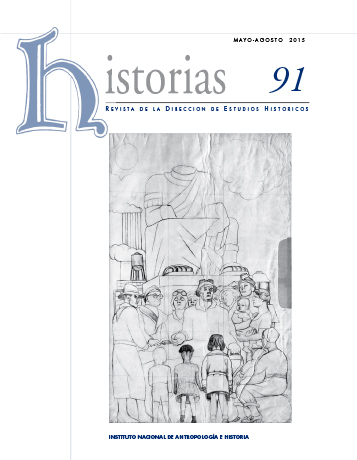Published 2017-06-15
Keywords
- diplomacy,
- South America,
- Ten Tragic Days,
- coup,
- Francisco I. Madero
How to Cite
Abstract
This paper analyzes South American diplomatic conduct in response to the coup that overthrew President Francisco Madero in February, 1913. First, it examines the ways in which diplomats from Argentina, Brazil, and Chile addressed the revolutionary process started in 1910. Secondly, it identifies the political and ideological horizon from which Mexico was perceived, with a particular emphasis on the almost unknown intervention of the Chilean representative. From this state, the paper explores the purposes that made these three nations assume an active diplomacy in the framework of the conflict that involved Mexico and the United States, since Woodrow Wilson became president of the U.S.
Downloads
References
- Manuel Márquez Sterling, Los últimos días del presidente Madero, La Habana, Imprenta Nacional, 1960, p. 232.
- Thomas MacGann, Argentina, los Estados Unidos y el sistema interamericano. 1880-1914, Buenos Aires, Eudeba, 1960; Arthur Whitaker, The United States and Argentina, Cambridge, Harvard University Press, 1954.
- Martin Mullins, In the Shadow of the Generals: Foreign Policy Making in Argentina, Brazil and Chile, Farham, Ashgate, 2006.
- Berta Ulloa, La Revolución intervenida. Relaciones diplomáticas entre México y los Estados Unidos. 1910-1914, México, El Colegio de México, 1971; Friedrich Katz, La guerra secreta en México, 2 vols., México, Era, 1982.
- Luis Palma Zúñiga, Historia del Partido Radical, Santiago, Andrés Bello,
- ; Julio Sepúlveda R., Los radicales ante la historia, Santiago, Andrés Bello, 1993; Peter G. Snow, Radicalismo chileno: historia y doctrina del Partido Radical, Santiago, Francisco de Aguirre, 1972; Juan García Covarrubias, El partido radical y la clase media, Santiago, Andrés Bello, 1990; Leopoldo Castedo, Chile: vida y muerte de la república parlamentaria, Buenos Aires, Sudamericana, 2001.
- William Belmont Parker, Chileans of today, Santiago, Imprenta Universitaria, 1920, pp. 351-352
- Ramón, Biografías de chilenos. Miembros de los poderes Ejecutivo, Legislativo y Judicial, 1876-1973, Santiago, Universidad Católica, 1999, vol. 2, pp. 210-211.
- John P. Harrison, “Henry Lane Wilson. El trágico de la decena”, en Historia Mexicana, vol. 6, núm. 3, enero-marzo de 1957, p. 385.
- Peter Calvert, The Mexican Revolution, 1910-1914, The Diplomacy of Anglo American Conflict, Cambridge, Cambridge University Press, 1968; Mark Gilderhus, Diplomacy and Revolution: U.S. Mexican Relations under Wilson and Carranza, Tucson, The University of Arizona Press, 1977; Edward P. Haley, Revolution and Intervention: The Diplomacy of Taft and Wilson with México, 1910-1917, Cambridge, MIT Press, 1970; Larry Hill, Emissaries to a Revolution, Woodrow Wilson‘s Executives Agents in Mexico, Baton Rouge, University of Louisiana Press, 1973; Friedrich Katz, op. cit., Isidro Fabela, Historia diplomática de la Revolución Mexicana, 2 vols., México, INEHRM, 1985; Kenneth J. Krieb, The Unites States and Huerta, Lincoln, University of Nebraska Press, 1969; Alan Knight, U.S. Mexican Relations, 1910-1940. An Interpretation, San Diego, University of California, 1987; Robert E. Quirk, An Affair of Honor. Wilson and the Occupation of Veracruz, Louisville, University of Kentucky Press, 1962.
- Cristián Guerrero Yoacham, Las conferencias de Niágara Falls: la mediación de Argentina, Brasil y Chile en el conflicto entre Estados Unidos y México en 1914, Santiago, Andrés Bello, 1966; Francisco Luis Teixeira Vinhosa, “A Diplomacia Brasileira e a Revolução Mexicana, 1913-1915”, en Revista do Instituto Histórico e Geográfico Brasileiro, núm. 327, abril-junio de 1980, pp. 19-81; Pablo Yankelevich, La diplomacia imaginaria: Argentina y la Revolución mexicana, 1910-1916, México, Sre, 1994.
- Fredrick B. Pike, Chile and the United States, 1880- 1962. The Emergence of Chile’s Social Crisis and the Challenge to United States Diplomacy, University of Notre Dame Press, 1963.

